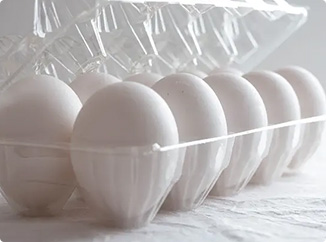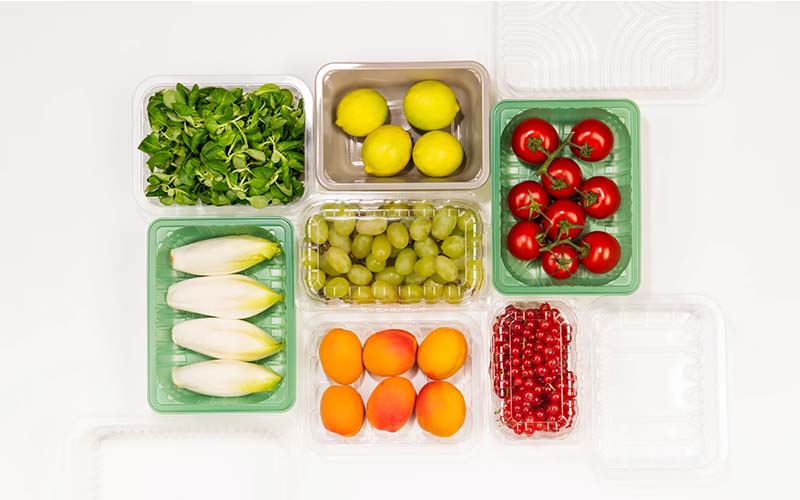
Yes, egg cartons can be recycled, but how they are recycled and how recyclable they are depends on what the egg carton is made of. Most egg cartons are made from cardboard or recycled paper, so they can usually be recycled. However, if the egg carton is made of Styrofoam (polystyrene) then it is not easily recyclable and many recycling centres do not accept this type of Styrofoam material. Therefore, knowing what an egg carton is made of is key to ensuring it is recycled correctly.
Egg cartons are available on the market in several different materials, each of which can be recycled in a different way and therefore have different recycling efficiency and environmental benefits.
1. Cardboard Egg Cartons (Pulp Egg Trays)
Cardboard egg cartons are the most common type of egg carton and are usually made from recycled paper or pulp. This type of egg carton is relatively easy to recycle as they are paper-based materials and are commonly accepted in recycling systems.
* Recycling process: Cardboard egg cartons are usually sent to paper recycling stations where they are cleaned, compressed, etc. and converted into new paper products. The recycled pulp can be used to produce new paper bags, cartons, etc., reducing the consumption of natural resources.
* Environmental significance: By recycling cardboard egg carton, we can save a lot of wood resources, reduce waste accumulation and lower greenhouse gas emissions.
However, if there is oil or other food residue on the egg carton, it may affect the recycling effect, so it is very important to clean it up before disposal.
2. Styrofoam Egg Cartons (Polystyrene Egg Trays)
Styrofoam egg cartons are commonly found in some supermarkets and shopping malls because they are lightweight and easy to protect eggs. However, they are relatively difficult to recycle because Styrofoam (polystyrene) is not easy to handle in most recycling systems.
* Difficulty in recycling: Polystyrene foam is technically complicated to recycle and has a low recycling value, with many local recycling facilities not accepting the material. Styrofoam not only takes up a lot of space, but also takes a long time to degrade, making it an easy source of environmental pollution.
* Environmental issues: If not recycled correctly, Styrofoam can cause long-term pollution of soil and water, so reducing the use of Styrofoam egg carton is the key to solving this problem.
If possible, try to choose egg cartons made of cardboard or biodegradable materials and avoid using Styrofoam packaging.
3. Biodegradable Egg Cartons
In recent years, with the increase of environmental awareness, many companies have started to use biodegradable materials to produce egg cartons, such as bamboo pulp and straw. These new materials not only reduce plastic pollution, but also better integrate with the natural environment.
* Recycling and degradation: Egg cartons made of biodegradable materials are able to decompose quickly under composting conditions and do not burden the environment in the long term. If local composting facilities are available, these egg cartons are an ideal environmental option.
* Environmental Advantages: The use of biodegradable materials contributes to environmental protection by reducing reliance on traditional plastic and paper resources while promoting the reuse of agricultural waste.
Thermoforming is a technique commonly used in the production of egg cartons, mainly to form different shapes of egg cartons. It can be applied to a wide range of materials, including plastic and pulp, to ensure the strength and shape of the egg carton while improving production efficiency.
* Principle of Thermoforming: In thermoforming, the manufacturer heats the raw material (e.g. pulp, plastic film) to a softened state and then stretches or presses it into the desired shape through a mould. This technology can be used not only for pulp egg trays, but also for other types of packaging containers.
* Technical Advantage: Thermoforming technology allows egg trays to better accommodate different types and sizes of eggs, improving packaging efficiency and reducing waste by lowering the amount of material used while protecting eggs.
This technological innovation not only promotes the development of the egg tray industry, but also promotes the research and application of environmentally friendly packaging materials.

Thermoforming machines are specialized in producing various food packaging products, including pallets, containers, lids, and more. These machines operate by heating a plastic sheet and using vacuum or pressure molding to shape it into specific forms. The entire machine uses a modular combination of stations: forming, punching, cutting, and stacking, allowing for fully automatic production that reduces labor costs. Key benefits include proven performance and process control, thanks to a servo motor-driven bench and the addition of a servo motor for stretching at the forming station of Sinoplast's new-generation thermoforming machine. This addition reduces noise and minimizes product stretch lines. Coupled with fast, efficient heating, this advanced technology enables greater precision and efficiency throughout the production process, resulting in high-quality products and production speeds of up to 30 cycles per minute.
The main parts of our thermoforming machines are made from internationally renowned brands to ensure quality and durability. These include MAC from the United States, Schneider from France, Siemens from Germany, and others. Additionally, the Siemens PLC control system further improves the automation of the machine.
The machine is compatible with PP/PS/PET and other plastic sheets, customers can adjust according to the product materials they want to produce, to provide the best solution for the production of plastic packaging!
The egg carton may seem like a simple everyday item, but its recycling carries important environmental significance. From cardboard egg cartons to Styrofoam egg cartons to new biodegradable materials, each egg carton has a different recycling method and environmental value. As consumers, we should be more aware of recycling and understand the recycling requirements of different materials to ensure that they are used effectively and reduce the burden on the environment.
In the future, as recycling technology continues to innovate and people's awareness of environmental protection increases, we have reason to believe that the recycling rate of egg carton will become higher and higher, and the cause of environmental protection will be given a greater boost. Every right recycling is a step towards a more sustainable future.
| Shipping | by sea |
| Sample lead timee | 10~20 days |
| Delivery time | about 30-45 days after order details and production confirmed. |
| Shipping | by sea |
| Sample lead timee | 10~20 days |
| Delivery time | about 30-45 days after order details and production confirmed. |
GET A QUOTE